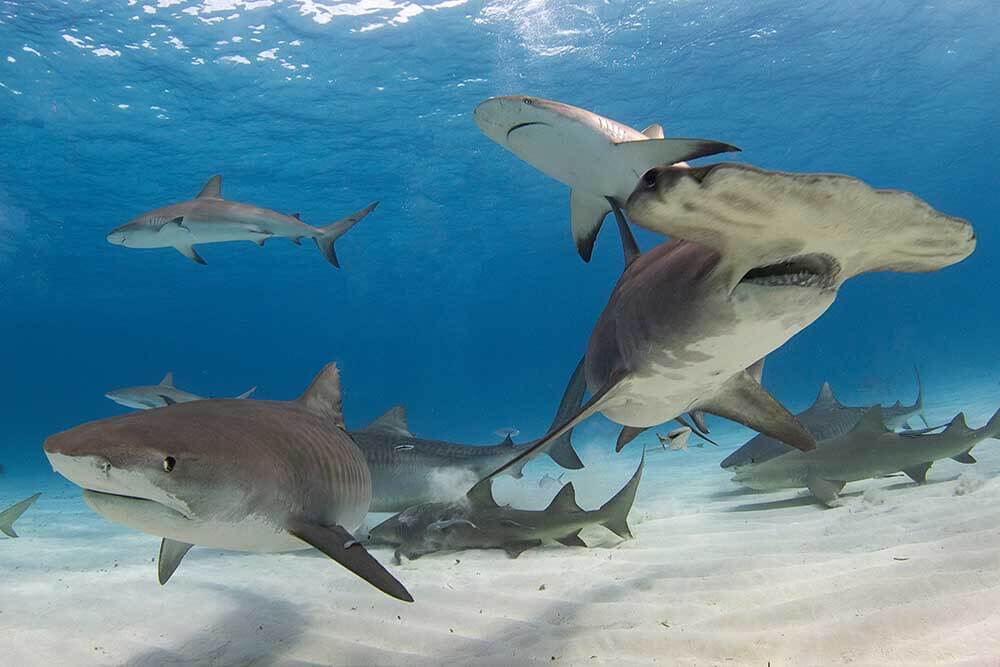
All species of requiem sharks, all species of hammerhead sharks, and all guitarfish are to be protected after being listed on CITES Appendix II following the 19th annual meeting of the Convention on Trade of Endangered Species of Wild Fauna and Flora
A total of 60 species, including tiger, bull, oceanic whitetip, blacktip, silky, blue, grey reef, whitetip reef and blacktip reef sharks have been given protections that prohibit trade in their meat and fins under international law. The amendment more than doubles the number of shark species protected under CITES from the previous total of 51.
The very positive outcome was thanks, in part, to PADI’s invitation by CITES host nation, Panama, to represent the voice of the scuba diving community at this year’s convention. PADI and its charitable PADI AWARE Foundation mounted a huge campaign to ask dive professionals and certified divers to sign a petition to push for government attendees to vote in favour of increased protections.
PADI’s campaign had a particularly important impact in Venezuela, Costa Rica, Fiji and Bahamas, where representatives made the economic case for sharks being an important source of dive tourism revenue, epsecially in Costa Rica, where 95 per cent of the country’s PADI dive opertors signed the letter that presented in-person to the nation’s delegation.
Related stories
Shark tourism generates hundreds of millions of dollars globally, providing a valuable source of income and supporting hundreds of thousands of jobs worldwide. Studies of the tourism sector indicate that shark-based tourism is on track to generate over three-quarters of a billion dollars a year over the next decade.
‘The decision to restrict the unsustainable global trade in some of the most threatened species on the planet provides us all with a hope and optimism that we are not too late to end the dramatic declines in the ocean’s most iconic, and critical, animals,’ said Ian Campbell, Associate Director of Policy and Campaigns for the PADI AWARE Foundation.
‘The listing of requiem sharks, [a family] that includes diver favourites such as the blacktip reef shark, bull shark and grey reef shark sends a strong signal that healthy populations of these animals are economically important far more than just the trade in their harvested fins, meat and organs.’
With the global pandemic having a significant impact on the economies of island nations such as Fiji, the Maldives and the Bahamas, the growth in shark tourism is likely to play a significant role in the financial recovery of countries with healthy shark populations around the world.
‘This result, to limit the international trade in shark species that are found at the world’s most popular dive spots, will bring a huge economic boost to communities across the globe,’ said Julio Salvatori, the South America Regional Manager for PADI and technical adviser to the Panamanian government. ‘The prospect of diving with sharks in their natural environment is a major attraction for the recreational dive sector, many of which made their concerns known to the decision-makers. We are optimistic that this can be a turning point for shark populations worldwide.’
Recent studies have indicated that sharks – and their close relatives the rays – are one of the most threatened groups of animals on the planet. Over a third of all species are classed as facing an increased risk of extinction, mainly due to overfishing, habitat loss and unsustainable trade.
‘We commend the strong leadership and commitment to conservation shown by the government of Panama, supported by many others, to secure this much-needed trade restriction,’ said Campbell. ‘We also realise that this decision is only the start of the recovery for many shark species, and the revenue-generating recreational diving sector is primed to play its role in implementing the commitments made today.’
- Full Circle – a return journey through 25 years of Sharm El Sheikh - 25 February 2026
- Hollis 200LX second stage regulator recall notice - 25 February 2026
- Student diver dies during training dive in Golfo Nuevo, Argentina - 20 February 2026


